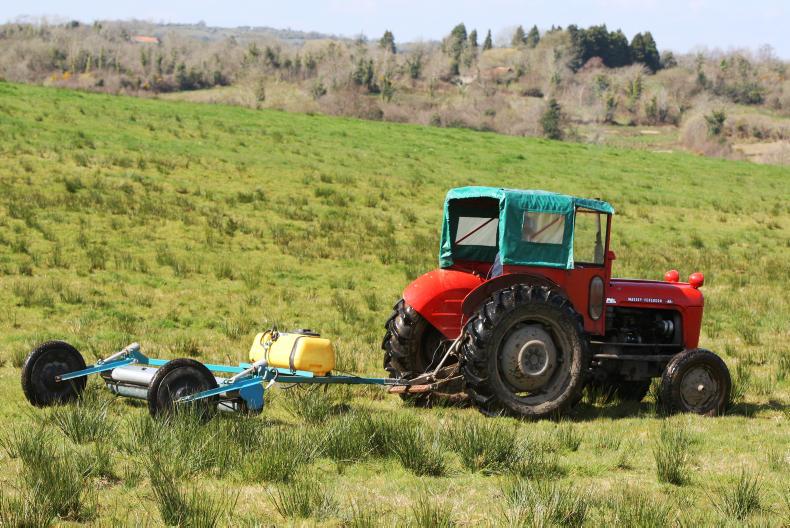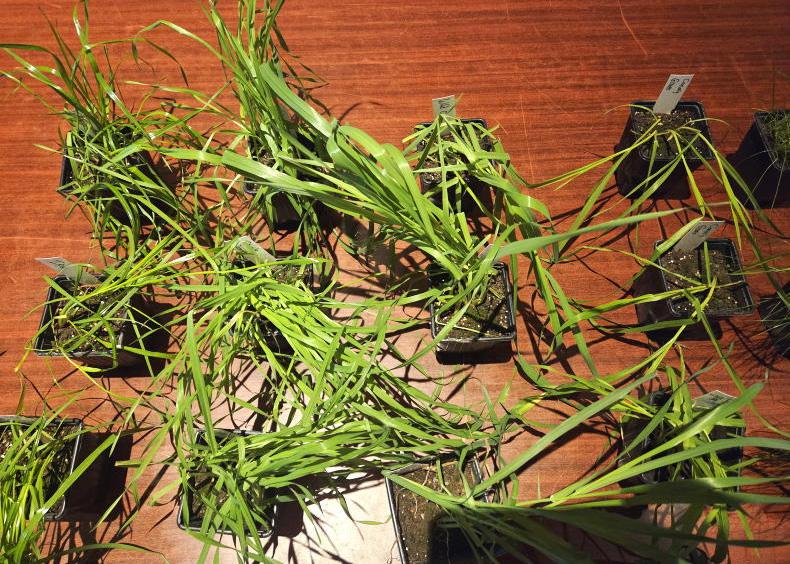Provisional information for 2018 shows a decrease in the detection of grassland herbicides, in particular MCPA, in drinking water supplies.
In order to maintain the downward trend, it is essential that all users of pesticides follow best practice measures to protect drinking water quality.
One area of emerging concern is the incorrect use of weed-wipers/lickers to control rushes on wet land.
Farmers must make sure they are aware of the rules for proper use of weed-wipers and that only professional use plant protection products with specific approval for weed-wipers are used.
An increasing number of grassland farmers are opting to use weed-wipers to control rushes on their holdings.
These machines utilise the significant height difference between the weeds to be controlled, eg rushes, and the desirable vegetation they seek to protect and promote (grasses, clover and other herbage species).
Herbicide
Typically, herbicide is applied to a synthetic carpet-like material which becomes saturated, and as the weed-wiper passes over the target area, the weeds come into contact with the herbicide retained on the carpet.
Weed-wipers have the attraction of allowing users to:
Selectively control problem weeds in grassland.Significantly reduce overall PPP usage, as only the problem weeds are targeted.As no spray is produced, problems associated with drift are eliminated.Given the increasing popularity of this type of approach, and the drying land conditions, it is timely to point out some of the requirements for farmers using weed-wipers:
Only professional-use products based on the active substance glyphosate can be used in a weed-wiper, eg Roundup, Mizer, Rambo 360, etc. Do not use products based on the active substance MCPA, as these are not approved for use in weed-wipers, and their use will result in penalties to your BPS application upon inspection.Only use the volume of product required to complete the weed-wiping task at hand. When the task is completed, park the weed-wiper well away from any open drains or watercourses.There is a perception that the use of a weed-wiper does not require the operator to be trained and in possession of a professional user in pesticides or PU number. This is incorrect – if you are using any professional use product, you must have completed an approved course of training, and subsequently registered with the Department. Additionally, you should be aware that while completion of training with regard to the use of a boom sprayer will cover you for using a weed-wiper on your own holding, it will not facilitate the provision of a contracting service. If you are providing a weed-wiping service, then you must complete a dedicated weed-wiping course, eg Lantra Level 2 Award in the safe application of pesticide using vehicle-mounted or trailed wick-type applicators or City & Guilds PA1 + PA2F – mounted or trailed wick-type applicator, or QQI Level 5 Mechanical Pesticide Application (5N20435).From the end of 2019, it will also be a requirement that weed-wipers must be tested by an approved equipment inspector. Initially, it is proposed that new weed-wipers will be exempt from testing for five years, but you must be able to provide an invoice to support the date of purchase. The Department is aware that a number of homemade machines have been placed on the market, which are unlikely to meet with the standards required by the equipment inspector, and depending on the number of such machines and their build quality, the five-year exemption rule may be reduced or removed.As with the use of all professional-use products, you must maintain accurate records of all pesticides applied on your holding, irrespective of the method of application.An information note on the use of weed-wipers is available on the pesticides section of the Department website at the following location: www.pcs.agriculture.gov.ie/sud/professionaluserssprayeroperators/
If using a weed-wiper to control rushes on your holding, take note of the following:
The person carrying out the weed-wiping must be trained and registered with the Department as a professional user. If you are providing a weed-wiping service, then you must complete a specialist weed-wiping training course. Accurate records of all pesticide applications on the holding must be maintained (includes weed-wiping). The only products registered in Ireland for use in weed-wipers are those based on glyphosate – do not use any product containing MCPA. Caution
A final word of caution – consideration should also be given to the fact that the current approval of the active substance glyphosate will expire in 2022, and its renewal after that date is not certain, which could leave weed-wipers obsolete in the absence of an alternative product registration.
Dr David McGilloway is head of efficacy, pesticide registration division (PCD), Department of Agriculture, Food and the Marine based in Backweston Campus.
Provisional information for 2018 shows a decrease in the detection of grassland herbicides, in particular MCPA, in drinking water supplies.
In order to maintain the downward trend, it is essential that all users of pesticides follow best practice measures to protect drinking water quality.
One area of emerging concern is the incorrect use of weed-wipers/lickers to control rushes on wet land.
Farmers must make sure they are aware of the rules for proper use of weed-wipers and that only professional use plant protection products with specific approval for weed-wipers are used.
An increasing number of grassland farmers are opting to use weed-wipers to control rushes on their holdings.
These machines utilise the significant height difference between the weeds to be controlled, eg rushes, and the desirable vegetation they seek to protect and promote (grasses, clover and other herbage species).
Herbicide
Typically, herbicide is applied to a synthetic carpet-like material which becomes saturated, and as the weed-wiper passes over the target area, the weeds come into contact with the herbicide retained on the carpet.
Weed-wipers have the attraction of allowing users to:
Selectively control problem weeds in grassland.Significantly reduce overall PPP usage, as only the problem weeds are targeted.As no spray is produced, problems associated with drift are eliminated.Given the increasing popularity of this type of approach, and the drying land conditions, it is timely to point out some of the requirements for farmers using weed-wipers:
Only professional-use products based on the active substance glyphosate can be used in a weed-wiper, eg Roundup, Mizer, Rambo 360, etc. Do not use products based on the active substance MCPA, as these are not approved for use in weed-wipers, and their use will result in penalties to your BPS application upon inspection.Only use the volume of product required to complete the weed-wiping task at hand. When the task is completed, park the weed-wiper well away from any open drains or watercourses.There is a perception that the use of a weed-wiper does not require the operator to be trained and in possession of a professional user in pesticides or PU number. This is incorrect – if you are using any professional use product, you must have completed an approved course of training, and subsequently registered with the Department. Additionally, you should be aware that while completion of training with regard to the use of a boom sprayer will cover you for using a weed-wiper on your own holding, it will not facilitate the provision of a contracting service. If you are providing a weed-wiping service, then you must complete a dedicated weed-wiping course, eg Lantra Level 2 Award in the safe application of pesticide using vehicle-mounted or trailed wick-type applicators or City & Guilds PA1 + PA2F – mounted or trailed wick-type applicator, or QQI Level 5 Mechanical Pesticide Application (5N20435).From the end of 2019, it will also be a requirement that weed-wipers must be tested by an approved equipment inspector. Initially, it is proposed that new weed-wipers will be exempt from testing for five years, but you must be able to provide an invoice to support the date of purchase. The Department is aware that a number of homemade machines have been placed on the market, which are unlikely to meet with the standards required by the equipment inspector, and depending on the number of such machines and their build quality, the five-year exemption rule may be reduced or removed.As with the use of all professional-use products, you must maintain accurate records of all pesticides applied on your holding, irrespective of the method of application.An information note on the use of weed-wipers is available on the pesticides section of the Department website at the following location: www.pcs.agriculture.gov.ie/sud/professionaluserssprayeroperators/
If using a weed-wiper to control rushes on your holding, take note of the following:
The person carrying out the weed-wiping must be trained and registered with the Department as a professional user. If you are providing a weed-wiping service, then you must complete a specialist weed-wiping training course. Accurate records of all pesticide applications on the holding must be maintained (includes weed-wiping). The only products registered in Ireland for use in weed-wipers are those based on glyphosate – do not use any product containing MCPA. Caution
A final word of caution – consideration should also be given to the fact that the current approval of the active substance glyphosate will expire in 2022, and its renewal after that date is not certain, which could leave weed-wipers obsolete in the absence of an alternative product registration.
Dr David McGilloway is head of efficacy, pesticide registration division (PCD), Department of Agriculture, Food and the Marine based in Backweston Campus.









SHARING OPTIONS